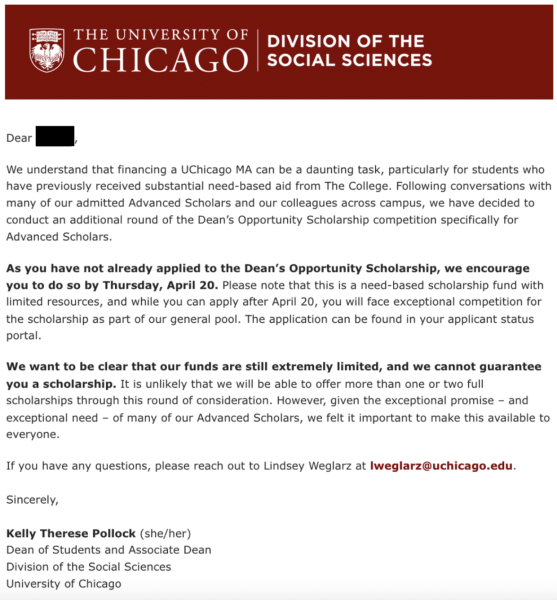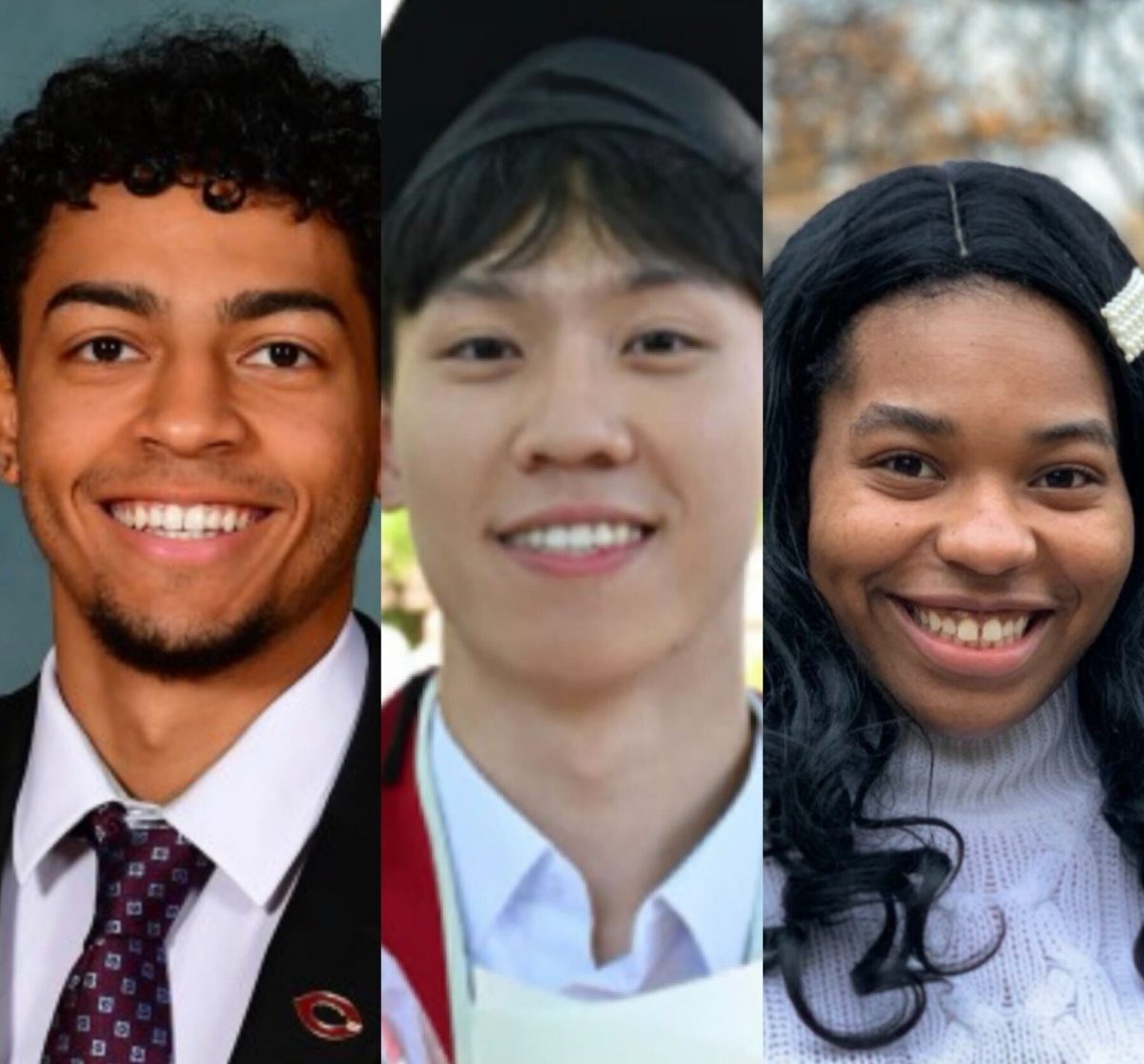In October 2023, the first cohort of 4+1 Advanced Scholars (4+1 students) began their graduate studies. The initiative, supported by UChicago President Paul Alivisatos and Provost Katherine Baicker, aimed to provide a smooth transition for UChicago undergraduates to master’s programs. In an interview with Meredith Daw, Executive Director of UChicago Career Advancement, The Maroon learned that 220 students applied to the first cohort, and 425 students have already applied to the 2024-25 cohort.
In a written statement, President Alivisatos expressed satisfaction with the program: “I am thrilled by the success of this first set of programs which represents a promising education pathway for students interested in engaging the very best of our liberal arts tradition in combination with studies that will further their professional aspirations.” So what makes this program different from other dual-degree programs, and is it worth your time and tuition?
UChicago’s dual-degree programs and the new Advanced Scholars (4+1) initiative have several key differences. First, dual-degree program applications typically go through graduate divisions directly, whereas the 4+1 program consists of an expedited application through UChicago Career Advancement, with no recommendation letters required.
Second, dual-degree programs typically require more forward planning. Most dual-degree applications happen in winter quarter of third year, and students remain enrolled in the College in their fourth year while taking graduate level courses and completing remaining bachelor’s requirements. They usually allow for a slight overlap of coursework. For example, the four-year joint BX/MS program in Computational and Applied Mathematics allows students to count two graduate courses for undergraduate credit, while the joint BX/MS program in Computer Science allows students to count two undergraduate courses for graduate credit.
Because students are still enrolled in the College, they get to keep their undergraduate financial aid package but are charged “graduate level tuition,” which can be slightly higher or lower based on the program. However, specific five-year dual-degree programs like the BA/MA in Humanities, BA/MS in Computational Analysis and Public Policy, or BA/MA in Social Work allot an extra year for only graduate coursework, and undergraduate aid is not typically available for the extra year.
On the other hand, students can apply to the 4+1 program in their fourth year and only start graduate coursework in their fifth year. Since there is no overlap between undergraduate and graduate enrollment, 4+1 students cannot benefit from undergraduate financial aid and must find alternative funding sources through their graduate programs, loans, or merit-based scholarships.
UChicago financial aid at the master’s level varies widely by program. It is also worth mentioning that the 4+1 program’s first cohort received a $15,000 Rudolph Scholarship, a scholarship introduced in response to the COVID-19 pandemic. Future cohorts will receive a reduced $5,000 scholarship from their respective Master’s divisions to support their additional year of study.
It is important to note the difference between dual-degree and 4+1 programs, since some programs in the 4+1 program are also listed as dual-degree programs on the College course catalog, including the BA/MA in Middle Eastern studies and BX/MS in Computer Science. UChicago’s dual-degree programs resemble those at other universities such as Duke or Northwestern because they can double-count courses for bachelor’s and master’s and require students to take both undergraduate and graduate courses in their fourth year.
So how can you decide which program is best for you? In order to find out, The Maroon delved into the experiences of three 4+1 program students: Steven Luo (MS Applied Data Science), Bryce Hopkins (MS Financial Mathematics), and Beverly Batts (MA Social Sciences).
Steven Luo
Luo is an international student and studied economics and statistics in the College. He initially chose economic consulting as a career path but realized in his fourth year that his personal interest lay more in technology consulting, pushing him towards data science. His review of the Applied Data Science master’s program was mixed.
“Economics at UChicago is very theoretical, and I wanted something more focused on data application,” Luo said. “[While] you have the opportunity to try lots of things, and the Data Science capstone project is very interesting, I wish the coursework provided more in-depth knowledge in regards to software.”
As an international student, Luo found aid options limited but stated that “I would have gone to graduate school regardless, since I felt a career change was needed.” The 4+1 program offers a benefit to international students in that non-STEM degree undergrads can be eligible for a two-year OPT STEM extension for F1 student visas if they pursue a STEM master’s degree. However, this additional benefit did not apply to Luo, who already possessed a STEM-extension-eligible degree through undergrad.
Master’s degree holders also have slightly better chances for longer-term residency status in the U.S. through the H-1B lottery, which allows U.S. employers to employ international workers in specialty occupations; obtaining a master’s degree makes H-1B lottery applicants eligible for “the master’s cap,” which designates a specific allocation of H-1B visas for individuals holding master’s or doctoral degrees.
Luo also found the career resources to be similar compared to undergrad. “If people want to change from a research path to industry, then I think the UChicagoGRAD resources are helpful. For me, I had already polished my resume and interview skills throughout my time in the College, so I didn’t learn anything new.”
Luo explained his decision to choose the program. “The reason why I picked the 4+1 was the efficiency. I was also accepted into other top programs such as Yale, but those master’s programs were two or more years,” he said. “While I don’t think entry-level undergraduate and graduate salaries in my field are too different, I believe a master’s degree will make me a more competitive candidate for senior roles.”
Bryce Hopkins
Hopkins studied business economics with a minor in statistics in the College and was also a captain on UChicago’s varsity men’s basketball team. “I was interested to find a way to use my extra year of NCAA eligibility [from COVID] while also advancing my career,” he said. Having secured a role with US Bank after graduation, he wanted to use the MS in Financial Math to learn more about financial processes and explore alternative career paths in quantitative finance down the road.
Hopkins describes the transition to the program as difficult at first, as the program only offers lectures at night which are all two to three hours long. “It felt a little overwhelming, especially having to balance that with my basketball team practices,” he said. However, he was positive about the coursework, citing his fall quarter Options Pricing course, as well as his newly acquired programming skills, as interesting and useful.
Hopkins was also more positive about graduate career resources offered specifically by the Financial Math program: “I think the program does a great job connecting students with their interests through alumni panels, career treks, and trading competitions…the program does open a good amount of doors.” Moreover, he found the financial aid options to be compelling, with a scholarship from the Financial Math program covering about 50% of program cost alongside the 4+1 scholarship from Career Advancement.
“There were times during my undergrad experience that I wish I was challenged more than I was; the Financial Math program definitely achieved that,” he concluded.
Beverly Batts
Batts was a public policy and human rights major in the College; she stated that the 4+1 was a great way to “gain more knowledge about topics in undergrad that I wanted to focus on, such as education policy and equity,” as a well as to “take some time to think about my future career path.” Alongside the Masters in Arts Program in the Social Sciences (MAPSS) curriculum, Batts is also pursuing the Education and Society certificate and hopes to attend law school in the future.
Batts emphasized the rigor of the MAPSS program, highlighting one class, “Qualitative Methods: Coding and Thematic Analysis,” which improved her coding and presentation skills. She also found herself much more prepared than her graduate program peers, having written a thesis during undergrad. “I have many friends where this is their first time writing a thesis, and they are freaking out,” she said.
Batts had mixed feelings about the financial aid options. Having been a QuestBridge Scholar (a four-year, no-loan scholarship) during undergrad, she was initially overwhelmed when considering financing options. “I wasn’t sure if I would end up going [to the program] by taking out loans,” she said. However, Batts applied for the full-ride Dean’s Opportunity merit scholarship in March and was accepted in April. “I’ve always been confident in my writing, and I decided to apply on an impulse.”

She emphasizes the need to “lean on your social networks developed during undergrad, because it may be difficult to find common ground with your master’s cohort,” particularly in regards to age and background. “There is a very large international student population in MAPSS, and it’s just kind of a different social sphere,” she says. Nevertheless, Batts advises students that “the program is a good thing to do if you want to explore academia in more depth, but only as long as you can afford it.”
What should I choose?
Ultimately, the choice to pursue a master’s degree is specific to you. Research by the Foundation for Research on Equal Opportunity shows that 40 percent of master’s degrees have a negative return on investment. A popular 2021 Culture Study newsletter piece titled “The Master’s Trap” also detailed the experiences of MAPH and MAPSS students specifically at UChicago who had taken out loans to pursue their master’s degrees. However, pursuing a dual-degree straight after a bachelor’s degree, particularly with scholarships or alongside undergraduate studies, may be beneficial if your career field typically requires a master’s degree to substantially increase earnings.
If you are:
A current second- or third-year undergrad who wants a dual degree, consider UChicago’s more traditional dual-degree programs. Program deadlines are department-specific but normally happen early in a student’s third year. Financial aid is also more flexible due to the overlap in undergraduate aid during your fourth year, as is maximizing your course credits by double counting graduate and undergraduate courses. With the right planning, it may be possible to gain an additional degree in four years for little to no extra fees.
If you are:
A fourth-year who wants to switch their career path late, or feels that a master’s degree is necessary to increase career earnings, the new 4+1 initiative may be for you. According to Daw, “students applying through the 4+1 [program] normally have a very good chance of being accepted, since they have proven they can already succeed at UChicago.”
When asked if they ultimately would recommend the 4+1 programs, Luo stresses to potential students to “be really targeted about what you want to get out of your program.” Hopkins says to “lean on people who have been through the program for advice: grad students, parents, professors.” Batts advises to “be wary of the more limited financial aid options for grad school and try your best to explore all department and university scholarships possible.”
The final round application deadline for the upcoming cohort is April 30th.
Editor’s note: The author is also a member of the first “4+1” cohort.














